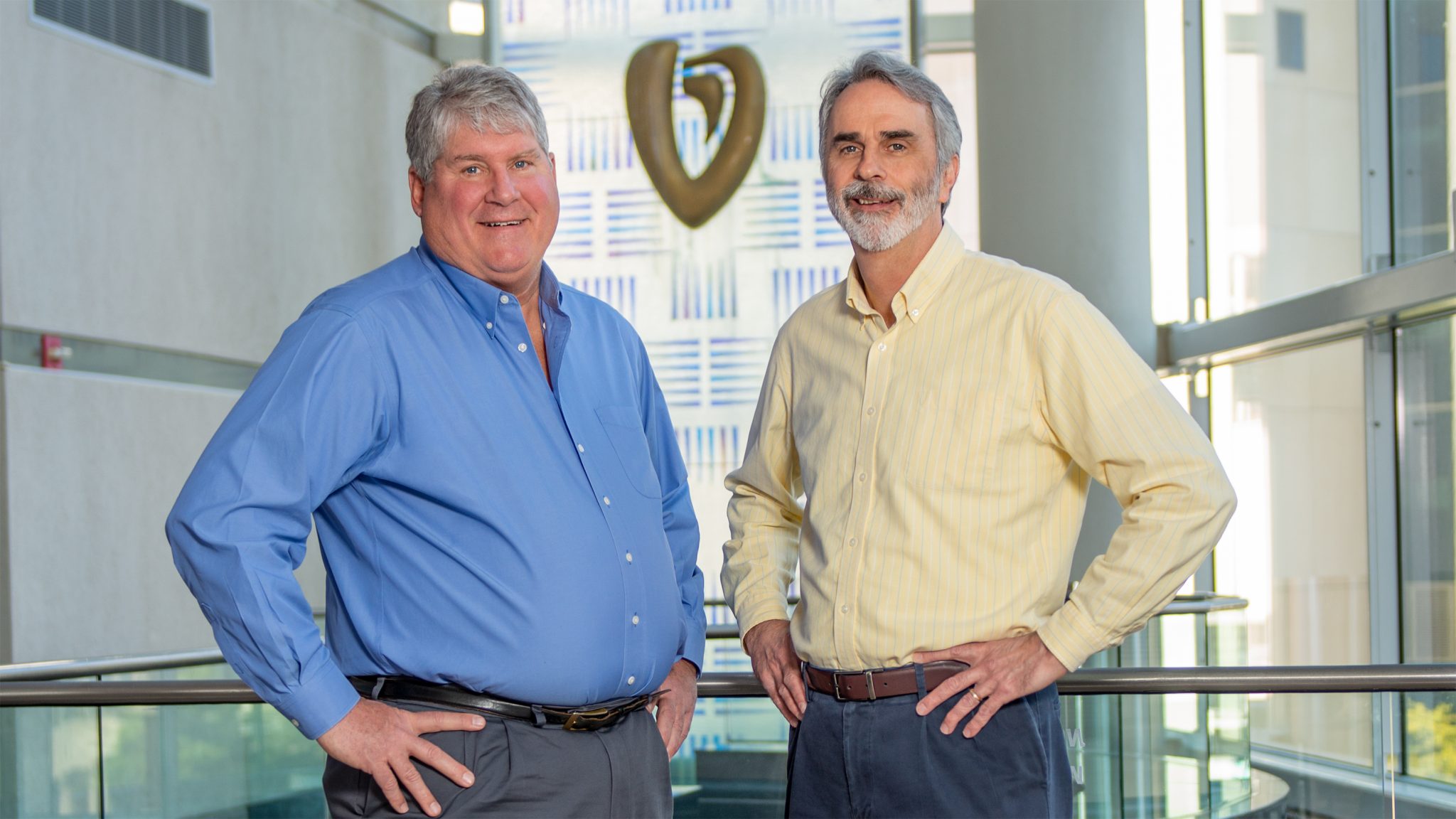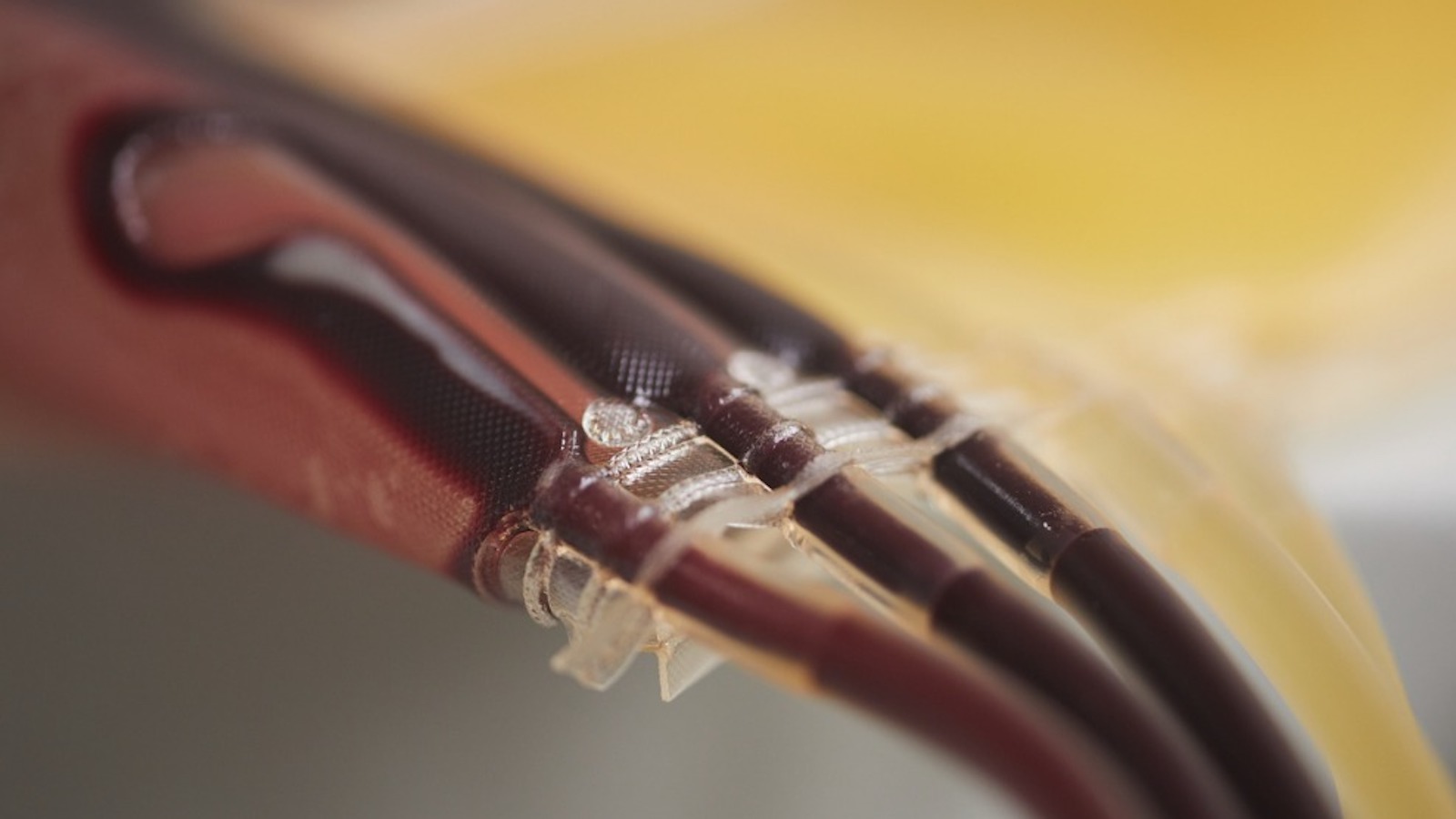Texas Heart Institute Investigators Receive Grant Through NHLBI Catalyze Program

Texas Heart Institute (THI) Molecular Cardiology researchers Peter Vanderslice, PhD, and Ronald J. Biediger, PhD, were recently awarded a grant from the National Institutes of Health (NIH) to optimize a novel, small-molecule drug that shows significant clinical promise. The grant from the National Heart, Lung, and Blood Institute (NHLBI) for the project “Optimization of Small Molecule Integrin Activators to Enhance Cord Blood Transplant” will provide about $1.1 million in funding over a two-year period. With this award, Drs. Vanderslice and Biediger join a community of investigators involved in NHLBI’s Catalyze Program, an innovative translational research support mechanism designed to bring new therapies, devices, and diagnostics to market.
The investigators have developed a unique integrin activator—a small-molecule drug that can promote cell adhesion—that has already shown the potential for use in cancer treatment and as an adjuvant for vaccines. For this project, the investigators hope to use their activator of cell adhesion to expand treatment options for patients who need a bone marrow transplant.
Bone marrow transplantation may be necessary for people who have hematologic malignancies—cancers of the blood, bone marrow, or lymph nodes—or certain genetic disorders. Umbilical cord blood transplantation is sometimes used as an alternative approach to conventional bone marrow transplantation; due to the nature of the cord blood cells, the matching of the donor to the recipient is less stringent, enabling the treatment of patients who could not be perfectly matched to a bone marrow donor. However, there are some limitations and disadvantages to the use of cord blood transplantation for adults. The relatively low number of stem cells found in cord blood may lengthen the time it takes for the patient’s transplanted immune system to become fully functional, increasing their risk of infection.

In preclinical studies, Drs. Vanderslice and Biediger have shown that the use of their integrin activator enhances the results of cord blood transplantation. Their small-molecule activator of cell adhesion improves the homing of the transplanted cells to the recipient’s bone marrow, and improves the rate of cell engraftment, decreasing the time to restoration of a functional immune system. This approach could lead to improved outcomes for patients receiving a cord blood transplant, especially those adult patients who otherwise could not find a suitable cell donor.
Under this grant award, the researchers will create the next-generation version of their compound, modifying the chemical structure of the integrin activator to optimize its applicability to a cord blood transplant clinical indication. At the end of the experimentation and testing process, they hope to select an improved compound for Investigational New Drug (IND)-enabling studies, an important step before clinical trials in humans can begin. This is particularly significant, as no other group has developed an activator of this class of integrins for clinical use. “Our small-molecule integrin activator is what is known as a ‘first-in-class’ compound, making it unique,” said Dr. Vanderslice. “The positive results from our recent Phase I human-safety trial indicate this compound is potentially poised to benefit multiple patient groups.”
NHLBI’s new Catalyze Program supports and accelerates the translation of basic science discoveries into new treatments, devices, and diagnostics for patients with heart, lung, blood, and sleep disorders. The objective is to move potential new medical products through the development process to the preclinical testing stage by providing research funding and other resources. Extra support for Catalyze investigators comes through their interaction within a network of experts in technology development and entrepreneurship, including product definition and development, regulatory affairs, pharmacology, toxicology, engineering, manufacturing, marketing, and commercialization. “In addition to providing significant resources to support technology development, the Catalyze funding mechanisms use a milestone-driven process to enhance project management,” said Dr. Biediger. “Taken together, this funding and focused support can truly maximize a project’s likelihood of success.”
The investigators are close collaborators in THI’s Molecular Cardiology Research Laboratories (MCRL), where Dr. Vanderslice is the Director and Dr. Biediger heads the department’s Medicinal Chemistry group; both are also Research Scientist Members of the THI Professional Staff. As former pharmaceutical industry professionals, they have extensive experience in drug discovery and development, coming to THI from Encysive Pharmaceuticals, Inc. in 2008. While in industry, Dr. Vanderslice and Dr. Biediger jointly led teams that successfully developed compounds that reached clinical testing for cardiovascular, autoimmune, and cancer indications. Both scientists have been honored by the National Academy of Inventors (NAI), which recognizes and encourages innovation and the translation of inventions to benefit society—through patents, licensing, and commercialization—as well as the education and mentoring of students.
To help develop and commercialize the novel technologies created in THI’s MCRL, Drs. Biediger and Vanderslice are part of a group of scientists and business professionals who co-founded 7 Hills Pharma, LLC. The company is located in the Texas Medical Center biotech incubator, JLABS @ TMC, which is affiliated with Johnson & Johnson Innovation. The CEO and fellow co-founder of 7 Hills Pharma is a seasoned entrepreneur, Upendra Marathi, PhD. For this project, Dr. Marathi and 7 Hills Pharma will serve as the accelerator partner, supplying additional expertise to advance the project to IND-enabling studies and eventual submission to the US Food & Drug Administration (FDA). For the investigators and their partners, the fundamental, long-term goal is to successfully develop small-molecule compounds and other THI technologies into new treatment options for patients.
With this project, Drs. Vanderslice and Biediger are continuing THI’s strong tradition of excellence in translational research to bring new clinical techniques, devices, therapies, and diagnostics to the patients who need them. “Translational research like this provides an essential link between the ‘discovery’ and ‘patient care’ pillars of our mission. The preliminary studies for use of this integrin activator in cord blood transplant suggest it could greatly expand the patient population that would benefit from this approach, so we are excited to see this potential recognized,” said Darren Woodside, PhD, THI Vice President for Research. “Drs. Biediger and Vanderslice are extremely talented scientists who lead an experienced drug discovery and development team. Their skillset is fairly rare in an academic setting, especially the in-house medicinal chemistry expertise provided by Dr. Biediger and his team,” he added.
“Our true commitment to translational research—the process of seeing a promising idea through the research, development, and approval stages so that it can ultimately benefit patients—is a huge part of the value that THI brings to the field of cardiovascular medicine and beyond,” said Joseph Rogers, MD, President and CEO of THI. “Projects like this one exemplify our patient-focused application of basic-science insights to real-world clinical challenges and Drs. Biediger and Vanderslice embody the spirit of innovation and excellence for which THI is known.”
The research described above is supported by the National Heart, Lung, and Blood Institute of the National Institutes of Health under Award Number R33HL161778. The content is solely the responsibility of the authors and does not necessarily represent the official views of the National Institutes of Health.
ABOUT TEXAS HEART INSTITUTE (THI)
Texas Heart Institute (THI), founded by world-renowned cardiovascular surgeon Dr. Denton A. Cooley in 1962, is a nonprofit organization dedicated to delivering the future of cardiovascular health through exceptional patient care, discovery, and a commitment to learning. Participating in research programs in cardiology, cardiovascular surgery, stem cell, and gene therapy, and regenerative medicine, THI’s scientists and physicians are spearheading some of the most innovative research in the medical field. Through its translational basic and clinical research programs, Texas Heart Institute is learning more every day about the underlying causes of heart disease and the ways to better treat and even prevent it. With initiatives ranging from postdoctoral and continued medical education to public outreach and scientific publications, THI is dedicated to spreading awareness and sharing updates on ways to prevent, treat, and defeat cardiovascular disease. As a global leader in patient care for nearly six decades, Texas Heart Institute has been ranked among the top cardiovascular centers in the United States by U.S. News & World Report for the past 30 years. With over 12 million visitors coming to its website from around the world every year, www.texasheart.org is just one of the ways THI is helping to educate people on the importance of heart health. For more information, please visit https://www.texasheart.org. @Texas_Heart




